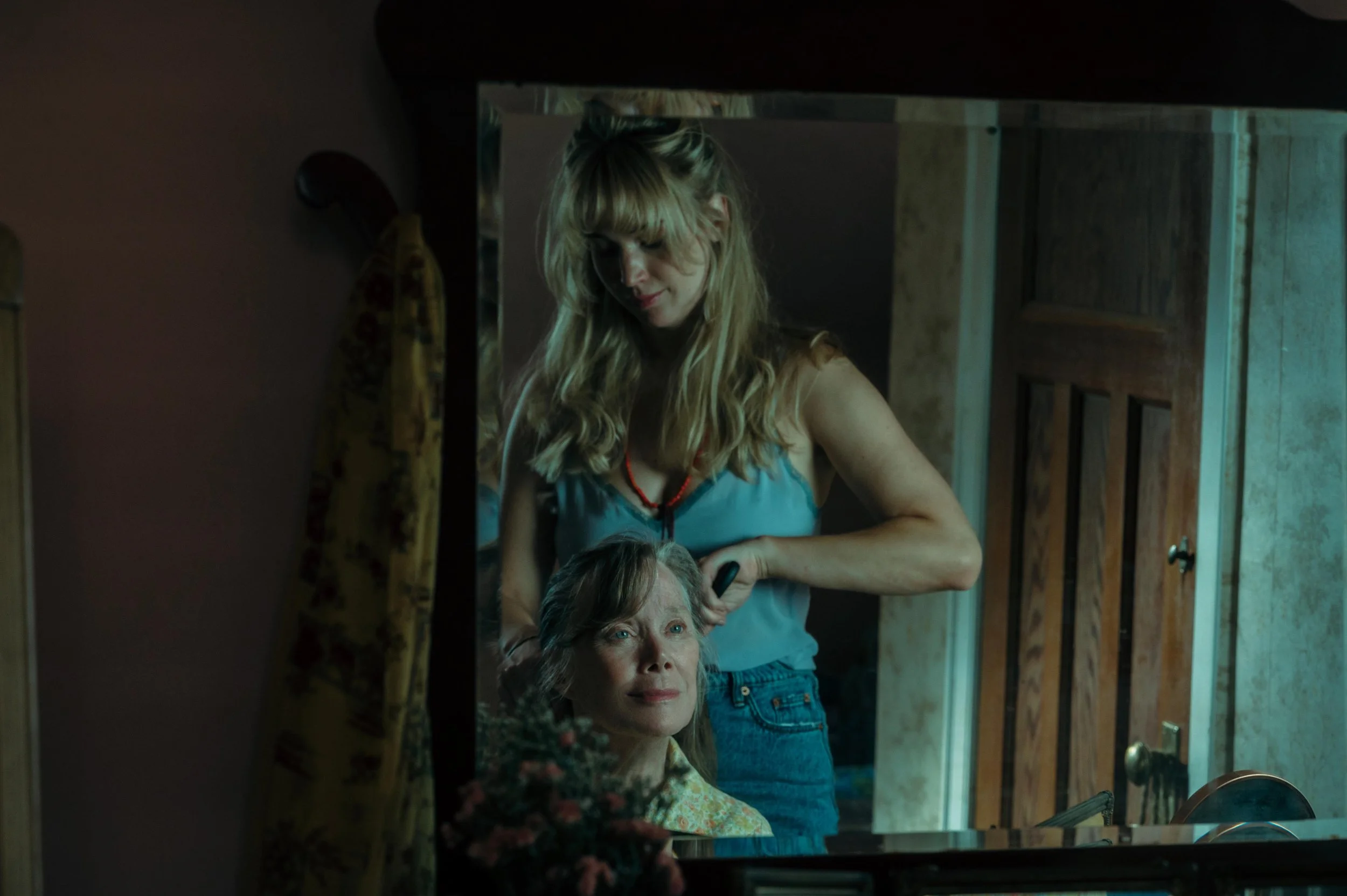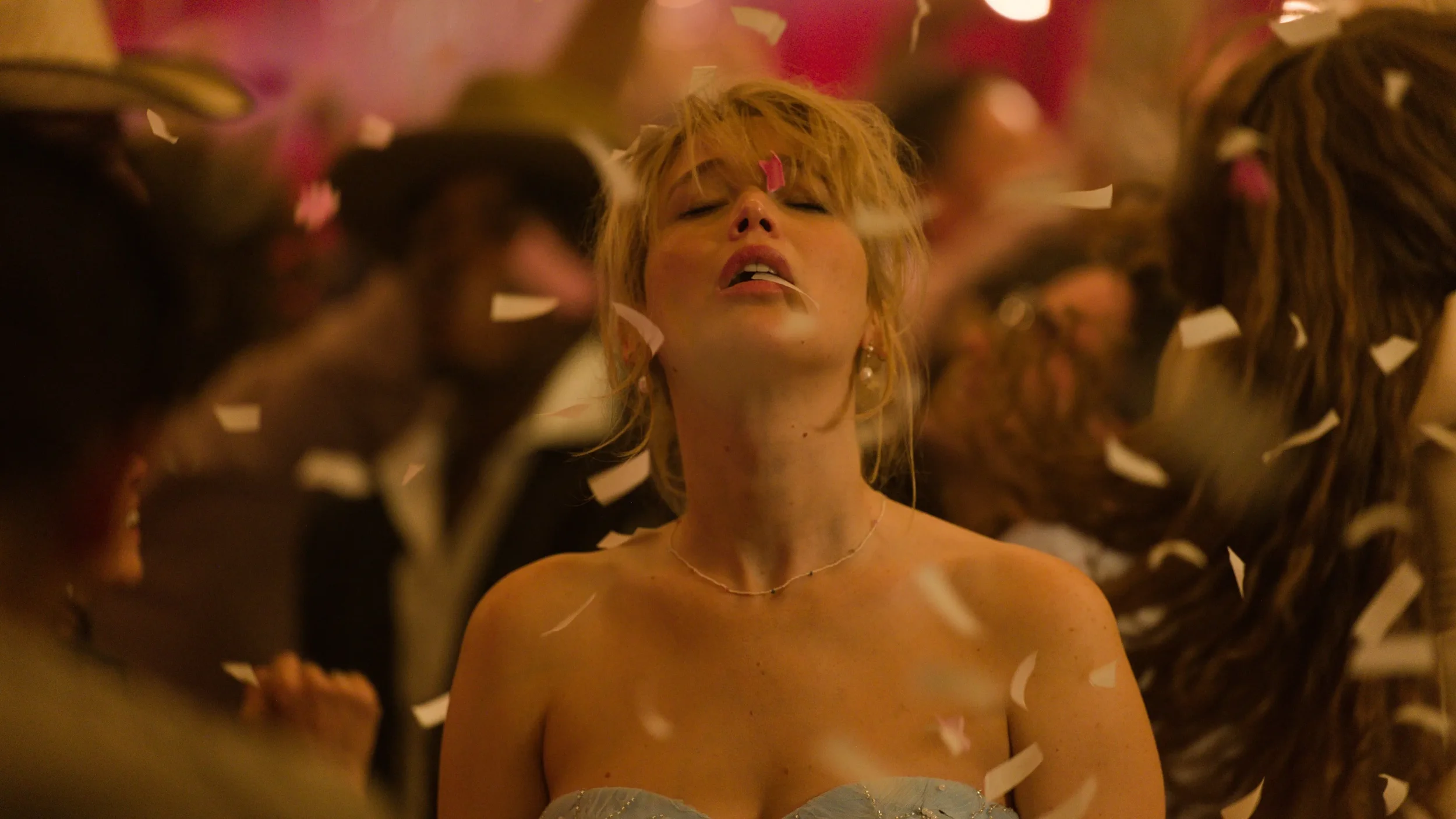Depression and Isolation in ‘Die My Love’
There’s a version of depression that seems like it was born with me. The familiar one that spills out of the cracks, cyclically deepening and rehealing all the time. A cross between sadness and numbness that has been around so long, I have a system to address it and send it on its way (god willing). Usually it only takes a couple of days to find footing again, to balance on the baseline.
My every day sickness sounds manageable written out like that, maybe mildly disruptive at most. But that is not the version of the illness Jennifer Lawrence’s character Grace experiences in Die My Love (2025). And that is not the version I was first confronted with when I was 24 and facing the terrifying consequences of loving.
We are introduced to Grace and Jackson (Robert Pattinson) as they arrive at Jackson’s deceased uncle’s house in rural Montana, their new home. This location is immediately isolating for Grace, who is coming from New York City. This is Jackson’s hometown, with his family nearby. His job often takes him on the road for days while Grace remains confined by the house as a writer and, eventually, a stay-at-home mom. Many of the local roads are dirt. It takes miles of walking to even see a neighbor. Jackson makes a comment about the quiet being good for Grace’s writing.
I made a similar environment change when I left Providence to spend two years in rural Delaware. The first year, I was entirely alone. The house to my right was abandoned; the space to my left, an open field. Out my front window there were cornstalks and a carriage museum that held drive-up mass on Sundays and proudly waved the confederate flag. That was the town’s main road.
Although I was bored more often than not and my closest friend for a while was the liquor store cashier, it was liberating. No one knew me and nothing mattered. I could lay out in my yard tanning and reading and drinking wine from the bottle until the frogs came out. I could leave my house without tiptoeing at 4 am to hook up with the single dad before his son got home from his sleepover. It was the first place I went to the movies alone. It was really good for my own writing too. But that was when I did not belong to anyone.
The change wasn’t subtle. One day the following year, I was 7 months into love with someone 10 hours away, working a new job that kept him busy for 16 hour days. Any comfort I once found in solitude was gone. I was waiting to finish out a contract I couldn’t afford to end early, the people around me felt temporary, and everything was deafeningly quiet. So, my mind couldn’t help but race. I couldn’t pick up a book or a pen, volunteer, go to the store, or make a connection because my whole body was infected with fear. Fear about the unrecognizable person I had become. Fear that he wouldn’t love this girl anymore. Fear that he was fucking someone else. I loved this man too much, and the once tolerable distance became wider and wider. There was no more life for me to make where I was, and it hollowed me out completely. My room became a prison. I’d wake up. Go to work. Come home. Stare at the wall. Stare at my phone, waiting. Hoping he could find 15 minutes in his day. I stopped eating. I used to catch up with my mom once every couple of weeks; suddenly, I had to call her every night just to talk me to sleep.
The scariest part of this 6-week period for me was that he wasn’t doing anything obviously wrong. He wasn’t purposefully ignoring me. He wasn’t manipulating or gaslighting me. He wasn’t even angry at my constant bids for reassurance (at first). There was no discernable reason for me to feel this way, but I was a girl whose life at that moment revolved around one thing: a love I was at risk of losing. But really, it had nothing to do with him. The days were endless and with each passing one, I thought of what could jolt me out of it, what I could do physically that would scare me into living again.
Some pits of despair go so deep you can’t crawl your way out, despite trying as hard as you can. Instead, you’re left with raw, bloody finger tips and nails scratched down to the quick - a visual we even get in the film. Grace’s depression, although rooted in being postpartum, brought me back to that time in my life. It gutted me. There were several scenes that brought me to instant tears in the theater: how Jackson watched her after she first returned from the hospital, like she was as breakable as the glass door she jumped through. I recognized that weary expression. When the injured dog was whimpering and she handed Jackson the gun saying, “Something you love is in pain.” Even at the glimpses of Grace, the real funny, charming Grace, when you think she’s finally gotten better. Because if anxiety, depression, psychosis can appear that quickly, they reappear just as fast.
Eventually, my worst spell ended without reason. I wasn’t in the depth of it anymore, but the edges were fuzzy for the next couple of months. I was still in love, finding my way back to myself. First, by closing out my last few weeks in Delaware with appreciation for the initial freedom the state granted me. Then, once in Boston, by starting grad school, by being in proximity to old friends, by having the possibility of making new ones. There was still a lack of safety and security in my relationship, but it felt more manageable because my life was full of other things again. Then I found out I was pregnant.
My period was a couple weeks late, and I couldn’t shake the feeling that the bullet I’d been dodging since I was 16 finally hit me. We were on vacation with his family. We were fighting a lot, but this time because he was working instead of having requested the time off. I sat in the hotel room upset; worried that if I did anything with his mom and sisters, my anger would spill everywhere in the comfort of female familiarity. So I stayed alone, isolated. I took two tests in the bathroom while he slept.
I did not have strong opinions on motherhood at this time. It wasn’t exactly taboo at my age, and I had been dating my boyfriend for over a year. I was raised Catholic but am a bigger believer in the right to choose. Still, I knew I wanted to be a mother at some point, so I worried that doing something to stop this pregnancy would get me punished later (like I said, raised Catholic). When I told my boyfriend, he was kind and gentle, supporting whatever decision I made, and was genuinely enthusiastic about both of our options. Actually, everything was so blissful for a while, I thought maybe I should have this baby. We were finally moving like a team more than ever.
I contemplated for a few weeks, weighing the pros and cons. Con: I was a semester into an expensive grad program, what if I can’t finish? Pro: Our baby would be so cute! Con: I was one month into a new job, how do you bring up maternity leave? Pro: My boyfriend is putting my needs over his own ambition! Ultimately, what swayed me: It was only a few months ago that I had felt fear that stopped my life in its tracks. Fear of losing someone I could realistically stand to lose. What would happen to me when I had someone in my life it would be unbearable to lose? I was not ready for that.
Through everything, Grace loves her baby more than anything and anyone. It is that love that drives her to madness and brings about her final word to Jackson, “Enough.” She is not well, she knows it. Thus, out of love for her child, and even her husband, she sacrifices herself to the fire in the woods. The weight of love can be too much; I know what it’s like to almost succumb to that pressure. Although Grace does love Jackson too, that love is expendable in comparison to her love for her son. That is not to say that this ending for her is admirable. It is tragic and horrifying, because it is a reflection of reality.
I cannot speak firsthand what it’s like to be postpartum or to experience related-psychosis, and it should not be lost on anyone that that is the main focus of this film. But what terrified me most is how quickly that change can transpire in your body and mind, without warning and without cure. How helpless it can make you feel, especially where there are no roots for you to flourish. Jackson’s mother repeatedly tries to help Grace, despite dealing with her own grief as a recent widow. Jackson’s friend even makes an attempt to relate to her struggles as appropriately as she could. But they are his people. There’s a lack of intimacy needed to make those conversations successful. Besides one scene in therapy, we don’t get any insight into Grace's past. We see no friends around her. She disappeared into another person’s life and that’s all we know of her: she is Jackson’s wife, Harry’s mom.
Although I did make a choice for myself, it ended up being that no choice was necessary. This had a way of making me feel powerless on its own. Through embarrassment and shame for something entirely natural, I had no one to turn to but my boyfriend. He was truly great, but it is so much for one relationship to carry. I didn’t know how to talk about any of it for a long time. Eventually, the peace with it all came once I told one friend, then another. By now, many people know - best friends, strangers in bars, Poetry workshops. Some will find out by reading this. The weight gets lighter and lighter. Grace’s never did, because sometimes, it can’t. Maybe one day I’ll be in the position to question motherhood again, but with so much to reasonably fear, who knows where I’ll land on it.



